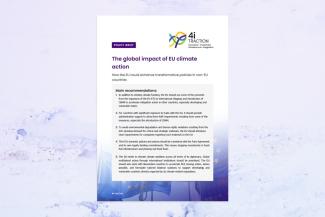
4i-TRACTION (2023): The Global Impact of the EU’s Climate Action. 4i-TRACTION Policy Brief. Climate Analytics, Berlin.
The global impact of EU climate action
How will EU’s climate action impact other countries and overall level of climate ambition? This policy brief analyses the global impacts and repercussions of the EU’s latest climate polices and spells out what they imply for other countries and global efforts to decarbonise.
As the EU undertakes economic transition, it will lean on the resources and collaboration of other nations, leading to shifts in global trade dynamics. Simultaneously, the EU's internal efforts to reduce emissions could produce ripple effects in countries closely tied to it in terms of trade and politics. This shift entails not just modifications in trade patterns, with essential materials and green energy products progressively replacing fossil fuel imports, but also a response from other nations to EU's policies with broader impacts, such as the launch of the Carbon Border Adjustment Mechanism (CBAM) or the inclusion of maritime beyond EU limits into the EU ETS.
This policy brief condenses the key messages from five thematic policy research papers pr with inherent impacts to third countries; the CBAM, critical raw material strategies, the maritime decarbonise regulations; security implications of fossil fuel trade, and the EU diplomacy’s role on the global stage. The brief explores how the EU’s own policies and experiences can serve as lessons for other countries, both in terms of their success and failures. The brief also provides recommendations about the ways in which the EU’s actions can facilitate emissions reduction abroad.
Main recommendations:
- In addition to existing climate funding, the EU should use some of the proceeds from the expansion of the EU Emissions Trading System (ETS) to international shipping and introduction of the Carbon Boarder Adjustment Mechanism (CBAM) to accelerate mitigation action in other countries, especially developing and vulnerable states.
- For countries with significant exposure to trade with the EU, it should provide administrative support to allow them fulfil requirements resulting from some of the measures, especially the introduction of CBAM.
- To avoid environmental degradation and human rights violations resulting from the EU’s growing demand for critical and strategic materials, the EU should introduce clear requirements for companies exporting such materials to the EU.
- The EU’s domestic policies and actions should be consistent with the Paris Agreement and its own legally binding commitments. This means stopping investments in fossil fuel infrastructure and phasing out fossil fuels.
- The EU needs to elevate climate ambition across all levels of its diplomacy. Global multilateral action through international institutions should be prioritised. The EU should also work with likeminded countries to accelerate first moving action, where possible, and formulate tailored bilateral solutions to support developing and vulnerable countries directly impacted by its climate-related regulations.
The policy brief is available for download here.